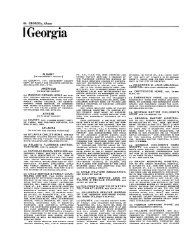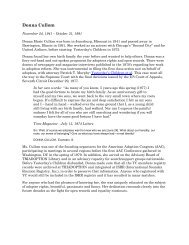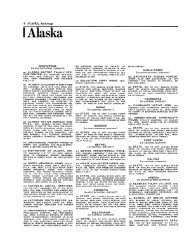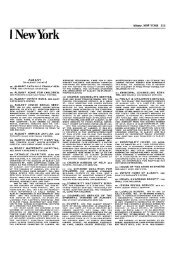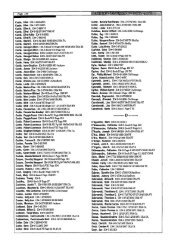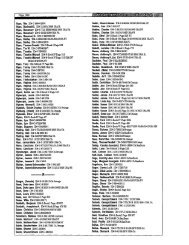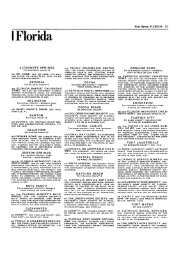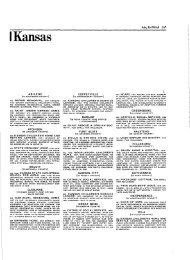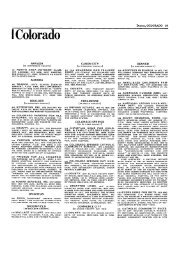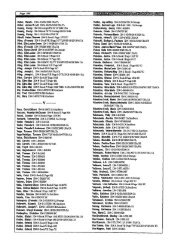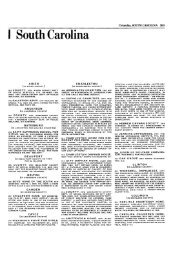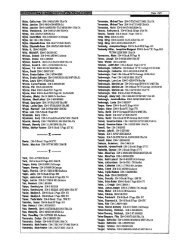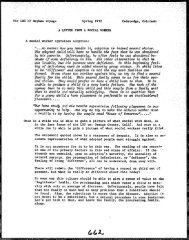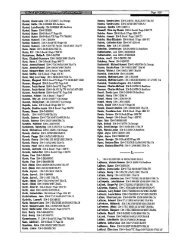Articles Book III - Pg 1-117 (Adoptees) - triadoption
Articles Book III - Pg 1-117 (Adoptees) - triadoption
Articles Book III - Pg 1-117 (Adoptees) - triadoption
You also want an ePaper? Increase the reach of your titles
YUMPU automatically turns print PDFs into web optimized ePapers that Google loves.
~.<br />
I<br />
r<br />
..<br />
-<br />
'.By Roberto Plutzik<br />
doplea in the United States<br />
now number in the millions,<br />
and a recent spate ol publick<br />
ty about adoption has made<br />
many Americans feel more at home<br />
with the sub)ed. Still, plenty of parents<br />
- and the children who<br />
come who to ive wlth them -. mntlnue to<br />
experience pmbiems for which they<br />
lee1 unprepared. . .:. "..-..: . ~ i. '<br />
Some live million Amerlaris arecurrently<br />
rqllr(ered as . hacln been<br />
adopted., acmrding to -re&! .rough<br />
estimata horn the; Government.<br />
Thou a& bn b no longer viewed<br />
with t f e cu r8' dty it used to amuw, for<br />
1<br />
tion, "Did f mme from your tummyl':<br />
Clare's sunnesred answer ir "You came<br />
lmm a mzher's tummy, but I didn't<br />
become your mother until ahenvard."<br />
Research has proven, she adds, that<br />
"it's not always what parents say that's<br />
mod Important In the early years but<br />
rather thc emotional environment ahd<br />
lone in which they sa It."<br />
. Aher a young chid. knows he's I<br />
adopted and is slruggling to undersand<br />
why, Its nor uncommon for him<br />
to &I agalnsl his ..adoptive parents.<br />
:'Most children, birth and adopted, at<br />
some point say they hate their parents<br />
and are goin to run away:' Clore explains<br />
~dds$urle Rynn, director of<br />
,the North Amcrkan Coundl on Adop<br />
table Children, "ll's very upsettin but<br />
-<br />
..........<br />
the people who adopt and (hechildren parentsmu not overreact. instea!,<br />
who are adopted there are sill man al what's maklng the: d~ild fca I.<br />
issues that need to be addred .:$.. ::~:- ........<br />
"Eve. !he adoptlon'ls yean in the<br />
. .<br />
maki the parent will be tmubled .<br />
with quarlons of hein# a p ,~arent l 0.;) .&apt tD mnke .<br />
or being able to love t c c lid, states . &e adopd &i[d feel<br />
Ellen Clore, director of the nurse pndk<br />
tionw "ID ram at tho University O! .<br />
'<br />
Virgi: "80 bqan studyin Ule mm -me ooergmteddve<br />
piex I...& of adopted chi k drcn and<br />
their parenis before she adopted a ......<br />
child herself. She believes that Mlcr .. . . . . . . . .<br />
awareness about potential pltlails Uiually ihc child wnnl's reassurance.<br />
among people who are going to adopt 7hc parents can say, 'You ore my child,<br />
on kter prepare ihem,br lhe ex-. I am your parenl. M5 . . work . . out the<br />
perience ol parenthood .?.- . - . pmblm."! .........., .;: ,..: - .. ?.<br />
Like all new parents, Individuals . A% dddhood pmgresw, other<br />
ivho a& expalenceleelhgrofdreu hurdiw remaln for parents and child.<br />
and ins f qwq in ihelr new maternal In an elfort to make thc adopt& chlld<br />
and paternal mla, ar well ar hurdles feel wanted - qwciatly in a family<br />
more wrticular to lhelr situations. wl~crc U~erc are also birth children<br />
I<br />
-<br />
~n; ol the most troubluome issuer some parznts CM bmme overpmtec<br />
for menls durln~ the child's early I live of the adopted lamily memhr. ib 11<br />
ear; is how and ihen to tdl the chiid lng XI will make him lee1 that much<br />
ie Is adopted andxherward, how to morc diltcrent, Clorc sap. ..<br />
wpc wlth his pnuibie feelingsol mnfw .: In the teen years, most parents lortily<br />
sion and annec "I tell oarents that lhcmseives aaalnsl lhc adopted child's<br />
bdore they ccn answer a )kun# child's<br />
I<br />
request lor 6nuae lnformatlon about<br />
queslons lhey mua mma to terms birth parents. Whilc Clore believes the<br />
with their own leelinas:' Clore says. child should be encouraged to wait un<br />
I "Do thw feel ............... threatk-ied bv kina 1 111 aher the acneral tur~%oil ol adoler II<br />
adoptive parents7 Do they feel lealous);; rrnce to lid his birth parents, witlldisaopmval<br />
or superiority toward the hoidln& lnlorn~atlon even bcfore this<br />
I hlrthinoth~r<br />
I and khcr7"<br />
alii5c czn ur~dcimir~e the longderm<br />
1 Clnre ........................<br />
at- advim not to wait until a adootive relalionahlo. "More than ever 11<br />
I child asks where he came from beiorc tl~e'~arents need io be honest With<br />
breakinn the news " ~rin~ up the word I tl~eir child and give It~lormalion Ii they<br />
I adootio~ so the child &.never re I know It: if they don't know, they must II<br />
nlehber not hearing it.!' she states say so. The pirent at thlr polnl Is leek<br />
"Before the a 015, nddrm <strong>III</strong>C /sue, lr~g very tt~renlened," siys Clo~e. "and<br />
bccaur n ch f" Id nds<br />
oarents - not .-. leachen . -~. or lricnds. Trust the child will leave are extremel~ slim. I:<br />
~<br />
murr be prrserved:' Kids wllo hear it that ndoptive parenu arc the tnie pzy. '<br />
from --.- outsiden muid be devnrlatcd.<br />
chological parents." Rynn advi~ I<br />
In response lo n preschooler's quer I adoptive ~~rcntstoh"vcrysupportive<br />
I!<br />
. . : I! of the need for it~fonnatlor~. o~ilitv<br />
I RM,, tr ,kc rw,,,~rb,~O prlvue rci~~lorces the child's feeling th;\l he<br />
Ute ot Pam~s<br />
I&- tio~lul. -. I dot.lrit belot,> . v 1:<br />
, _ . I _<br />
Al<br />
to hear it froin I needs lo bc reminded that thect~anca I




